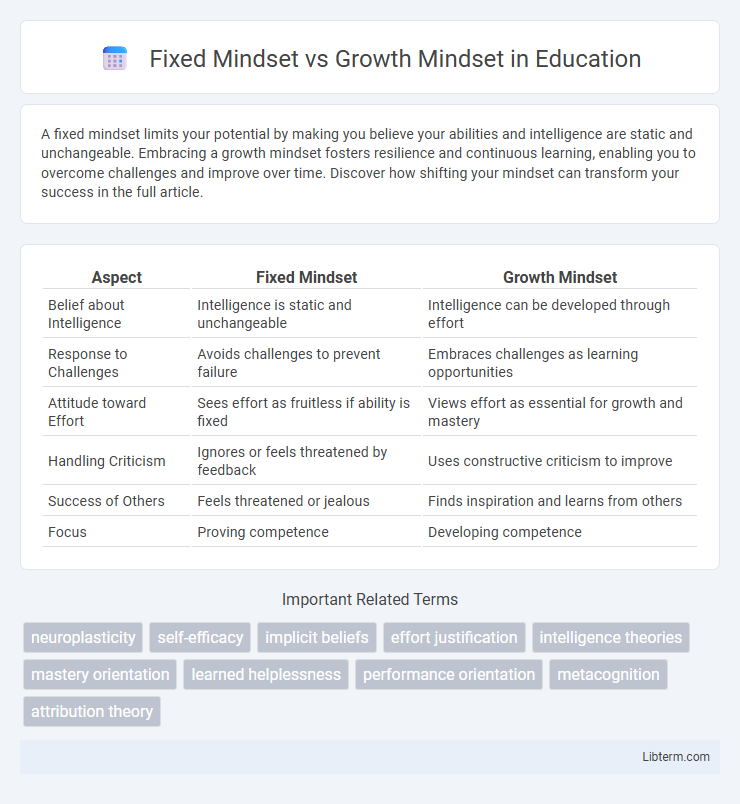A fixed mindset limits your potential by making you believe your abilities and intelligence are static and unchangeable. Embracing a growth mindset fosters resilience and continuous learning, enabling you to overcome challenges and improve over time. Discover how shifting your mindset can transform your success in the full article.
Table of Comparison
| Aspect | Fixed Mindset | Growth Mindset |
|---|---|---|
| Belief about Intelligence | Intelligence is static and unchangeable | Intelligence can be developed through effort |
| Response to Challenges | Avoids challenges to prevent failure | Embraces challenges as learning opportunities |
| Attitude toward Effort | Sees effort as fruitless if ability is fixed | Views effort as essential for growth and mastery |
| Handling Criticism | Ignores or feels threatened by feedback | Uses constructive criticism to improve |
| Success of Others | Feels threatened or jealous | Finds inspiration and learns from others |
| Focus | Proving competence | Developing competence |
Introduction to Mindsets: Fixed vs Growth
Fixed mindset individuals believe their intelligence and abilities are static traits, leading to a fear of failure and avoidance of challenges. Growth mindset embraces the idea that skills and intelligence can be developed through effort, learning, and persistence, fostering resilience and continuous improvement. Understanding these contrasting mindsets is crucial for personal development, academic success, and professional growth.
Defining Fixed Mindset
A fixed mindset is characterized by the belief that intelligence, talents, and abilities are innate and unchangeable traits. Individuals with a fixed mindset often avoid challenges, fearing failure due to perceived limitations in their skills. This perspective hinders personal growth by discouraging effort and persistence in learning new skills or overcoming obstacles.
Defining Growth Mindset
A growth mindset is the belief that abilities and intelligence can be developed through effort, learning, and perseverance. Emphasizing continuous improvement, this mindset encourages embracing challenges, learning from criticism, and valuing the process of growth over innate talent. Research by psychologist Carol Dweck highlights that individuals with a growth mindset achieve higher motivation and success in education, career, and personal development.
Key Differences Between Fixed and Growth Mindsets
A fixed mindset assumes abilities and intelligence are static traits, leading to avoidance of challenges and fear of failure, while a growth mindset embraces learning and effort as paths to development. Individuals with a growth mindset view setbacks as opportunities for improvement, whereas those with a fixed mindset see them as reflections of inherent limitations. This fundamental difference influences motivation, resilience, and achievement across personal and professional domains.
Impact on Learning and Success
A fixed mindset limits learning by causing individuals to avoid challenges and fear failure, which stifles personal growth and achievement. In contrast, a growth mindset encourages embracing challenges and viewing failures as opportunities for improvement, leading to higher resilience and sustained success. Research by psychologist Carol Dweck demonstrates that students with a growth mindset achieve better academic outcomes and greater motivation.
Origins and Development of Mindsets
Carol Dweck's research at Stanford University pioneered the concepts of fixed and growth mindsets, revealing how individuals' beliefs about intelligence shape their learning behaviors. Fixed mindset originates from early experiences emphasizing innate talent, causing avoidance of challenges to protect self-worth. Growth mindset develops through environments encouraging effort and resilience, promoting continual learning and adaptation.
Mindsets in Education and Workplaces
Mindsets in education and workplaces significantly impact motivation, learning, and performance, with a fixed mindset limiting potential through fear of failure, while a growth mindset fosters resilience and continuous improvement. Research by Carol Dweck highlights that students and employees with a growth mindset demonstrate higher engagement, adaptability, and achievement by embracing challenges as opportunities to develop skills. Implementing growth mindset strategies in schools and organizations promotes a culture of feedback, effort, and persistence, crucial for long-term success and innovation.
Overcoming a Fixed Mindset
Overcoming a fixed mindset involves embracing challenges and viewing failures as opportunities for growth, which rewires the brain to develop new skills and resilience. Research from psychologist Carol Dweck highlights that cultivating a growth mindset enhances motivation, learning, and overall achievement by shifting one's perception of intelligence as malleable rather than static. Strategies such as adopting positive self-talk, seeking constructive feedback, and setting incremental goals effectively transform limiting beliefs into adaptive behaviors.
Strategies to Cultivate a Growth Mindset
Implementing strategies such as embracing challenges, learning from failures, and seeking constructive feedback are key to cultivating a growth mindset. Practicing self-reflection and setting incremental goals enhances neuroplasticity, promoting continuous personal development and resilience. Encouraging a focus on effort rather than innate ability fosters adaptability and sustained motivation in educational and professional environments.
Conclusion: Embracing Growth for Lifelong Success
Embracing a growth mindset fosters resilience, adaptability, and continuous learning, essential for lifelong success in both personal and professional realms. Fixed mindsets limit potential by creating fear of failure and resistance to change, while growth mindsets encourage challenges as opportunities for development. Cultivating this mindset transforms obstacles into stepping stones, leading to sustained achievement and fulfillment.
Fixed Mindset Infographic

 libterm.com
libterm.com